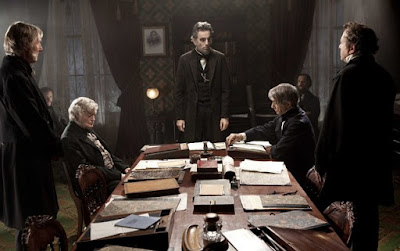 |
| A picture of Lincoln along with other government officials from the movie "Lincoln" |
2. The movie provided evidence of Lincoln's perspective, similar to the Lincoln Letters, by showing his internal struggle with whether the abolition of slavery was necessary for the Union. He is shown throughout most of the movie wanting to end slavery with this new 13th Amendment, but unsure whether it would be feasible and whether it was the right choice to make for the nation. He eventually decides in his mind that the amendment is necessary to the nation's longevity and well-being, so he then commits all of his efforts to getting it passed and abolishing slavery, which is is ultimately successful in despite great opposition from many.
3. Lincoln believed that the 13th Amendment was essential because he thought it was the only way to keep the Union together permanently. He could have ended the war without abolishing slavery, but he thought that ending slavery was necessary for the nation to be repaired. His view on this evolved over time, because at first the only argument he had against slavery was on moral grounds, but then by the end of the war he believed slavery not only should be abolished, but needed to be.
4. The movie complicated the narrative that the North was against slavery and wanted racial equality and the South was for slavery and against racial equality by showing that not everyone who was against slavery wanted racial equality. For example, many Republicans who weren't radical did not like slavery, but did not want racial equality, primarily for fear that the freed slaves would be able to vote and would have the same power as themselves.
5. In the film, many people seemed to resist the end of slavery not because they thought that slavery was morally acceptable, but rather because they were afraid of what would happen if slaves were freed and given equal rights as white men. They were afraid that slaves would have the right to vote and participate in government, having as much power as the they themselves possessed. Them movie did not depict this opposition as a concern for property rights as much as a fear for what the slaves would do to them if they had equal power under the law.
No comments:
Post a Comment